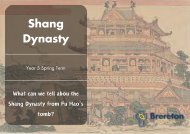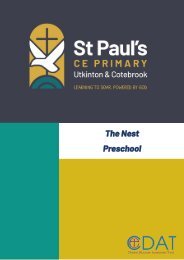You also want an ePaper? Increase the reach of your titles
YUMPU automatically turns print PDFs into web optimized ePapers that Google loves.
Roman<br />
Britain<br />
Year 3 Summer Term<br />
Why did the <strong>Romans</strong> come<br />
to Britain?
Unit Overview<br />
In this unit, pupils will learn about the Roman empire and how the<br />
<strong>Romans</strong> invaded Britain. Using a range of sources, pupils will explore<br />
why the <strong>Romans</strong> came to Britain and the impact they had on those<br />
living in Britain.<br />
Pupils will learn about the invasion of Britain and life before the<br />
<strong>Romans</strong> conquered, They will review artefacts found in Chester and<br />
make deductions about Roman life in Britain. After learning about the<br />
Roman retreat, pupils will explore the legacy left behind and debate<br />
whether the invasion was a good or bad thing.<br />
Pupils will also explore the establishment of Christianity in Britain.<br />
This unit builds upon the pupils’ prior knowledge of invasion and<br />
empire and prepares the children for future learning on trade and<br />
migration.
Golden Threads<br />
Golden Thread: Invasion & Empire, Signifance, Trade & Employment<br />
Pupils have explored the concept of empire when learning about the Victorians<br />
(Y2) and famous monarchs (Y2).<br />
When studying religious beliefs, pupils will have already studied neolithic beliefs<br />
and the esablishment of the Church of England. This unit will develop their<br />
understanding fo beliefs travelling via armies and trade people.<br />
During this unit, pupils will learn about how trade and employment allowed people<br />
in Britian to prosper during this period and this will link to future units on the<br />
Vikings and the Windrush. It will also build upon their knowledge of farming (Y1)<br />
and<br />
Family Tree<br />
Timeline:<br />
55 BC<br />
Julius Caesar heads first<br />
Roman Invasion but later<br />
withdraws<br />
50 AD<br />
London founded.<br />
61 AD<br />
Boadicea leads the Iceni<br />
in revolt against the<br />
<strong>Romans</strong><br />
122-128 AD<br />
Emperor Hadrian builds a<br />
wall on the Scottish<br />
Border<br />
43 AD<br />
<strong>Romans</strong> invade and<br />
Britain becomes part of<br />
the Roman Empire<br />
70 AD<br />
<strong>Romans</strong> conquer Wales<br />
and the North<br />
140 AD<br />
<strong>Romans</strong> conquer<br />
Scotland<br />
8000 BC 117 AD<br />
306 AD<br />
Constantine the Great<br />
declared Emperor at<br />
York<br />
350 AD<br />
The Picts and Scots<br />
attack the border<br />
401-410 AD<br />
The <strong>Romans</strong> withdraw<br />
from Britain: Anglo<br />
Saxons migrants begin to<br />
Settle
Love God, Love Learning, Love One Another - Enabling Everyone to Flourish<br />
Overview of Unit<br />
Lesson One:<br />
Pupils will be able to explain how<br />
the <strong>Romans</strong> came to Britain and<br />
where from.<br />
Before beginning, pupils will explore what they already know about migration.<br />
Why do people move towns/cities/countries? Do they know of any examples?<br />
Why did those people move?<br />
Explain that in this unit, we will uncover why the <strong>Romans</strong> came to Britain. Pupils<br />
will begin by learning who the <strong>Romans</strong> were, where they lived and why they<br />
expanded their empire. Pupils will have some independent time to explore nonfiction<br />
books and maps and feedback what they found out. Pupils will learn<br />
about the Roman invasion of Britain, learning about the Celts and Boudica.<br />
Pupils will then practise taking part in Roman drills and re-enact the invasion of<br />
Britain through role play.<br />
Lesson Two:<br />
Pupils will able to use sources and<br />
non-fiction books to find out life in<br />
Roman Britian.<br />
Pupils will recap on the learning from the previous lesson by using key images to<br />
explain where the <strong>Romans</strong> came from and how they invaded Britain. Take it in<br />
turns to explain to their Kagan partners. Did they include all key facts?<br />
Pupils will learn about life before the <strong>Romans</strong>, including homes, beliefs, jobs and<br />
social activities, before learning about the changes the <strong>Romans</strong> brought. Pupils<br />
will learn that though the Celts submitted by force, there were benefits to<br />
Roman rule. Pupils will discover how we know about Roman through artefacts<br />
and buildings discovered during archeological digs. Focussing on Chester,<br />
children will explore artefacts found and present their findings to the class.
Love God, Love Learning, Love One Another - Enabling Everyone to Flourish<br />
Overview of Unit<br />
Lesson Three:<br />
Pupils will be able to list the impact<br />
<strong>Romans</strong> had on Britain.<br />
In order to recap on prior knowledge, pupils will choose an image of an artefact<br />
and explain its relevance to their partner. Recap on our timeline and why the<br />
<strong>Romans</strong> came to Britain.<br />
Pupils will learn about the <strong>Romans</strong> retreat and what they left behind (aqueducts,<br />
roads, sewers etc). Pupils will list these in terms of importance and explain their<br />
justification.<br />
Pupils will also learn about the introduction of Christianity to Britain and create<br />
a comic book timeline to show the transition from pagan beliefs, to Christians<br />
executed in Britian, to the establishment of Christian churches.<br />
Lesson Four:<br />
Pupils will present a balanced<br />
argument.<br />
Written Assessment: Pupils will<br />
write a balanced argument for or<br />
against the Roman occupation of<br />
Britain.<br />
Pupils will recap on their knowledge of the <strong>Romans</strong> in Britain by discussing a<br />
quote from a Roman living in Britain. Pupils will then consider quotes from<br />
different groups of people and make a list of good and bad consequences. Draw<br />
out that invasion often results in a negative impact initially but migration can<br />
brings lots of positive outcomes. Hot seat pupils for and against the Roman<br />
occupation of Britain. Give the pupils an allotted amount of time to complete<br />
their arguement before hot seating them.
Vocabulary<br />
Historical<br />
Knowledge<br />
Place the time studied on a time line <br />
Use dates and terms related to the study unit<br />
and passing of time <br />
Sequence several events or artefacts<br />
Empire<br />
Emperor<br />
Invasion<br />
A group of territories under one rule<br />
A man who rules an Empire<br />
To enter as an enemy, by force, to take contro<br />
Chronology<br />
Find out about every day lives of people in time<br />
studied <br />
Compare with our life today <br />
Identify reasons for and results of people's<br />
actions <br />
Understand why people may have wanted to do<br />
something<br />
Conquest<br />
A military invasion<br />
Interpretation of<br />
History<br />
Identify and give reasons for different ways in<br />
which the past is represented <br />
Distinguish between different sources – compare<br />
different versions of the same story<br />
Rebellion<br />
Celts<br />
Barbarian<br />
A fight against the ruler<br />
The people if the Iron Age who occupied Britain<br />
A person from a different land believed to be inferior<br />
Historical<br />
Enquiry<br />
Use a range of sources to find out about a period<br />
Observe small details – artefacts, pictures <br />
Select and record information relevant to the<br />
study <br />
Begin to use the library and internet for<br />
research<br />
Revolt<br />
When a large number of people refuse to be ruled &<br />
take action against it<br />
Organisatin &<br />
Communication<br />
Communicate knowledge through discussion, role<br />
play and writing.<br />
Tribe<br />
A group of people following the same beliefs living as a<br />
community with a leader<br />
Key Skillss
Homework Challenges<br />
Research a key person and write a biography.<br />
Design a Roman town or house.<br />
Research towns and cities where the <strong>Romans</strong> camped and create a presentation.<br />
Assessment<br />
Socrative Quiz<br />
RECOMMENDED READS<br />
RECOMMENDED READS<br />
RECOMMENDED READS<br />
Enrichments<br />
Trip to Chester to walk the walls, visit the amphitheatre<br />
and visit the Grosvenor Museum.
Places to Visit<br />
Minerva’s Shrine<br />
Chester Roman Gardens<br />
Chester Roman Amphitheatre<br />
Wigan Roman Bath House<br />
We challenge our pupils to<br />
visit as many of these<br />
places as possible.<br />
Roman Trail Middlewich<br />
Ribchester Roman Museum
















